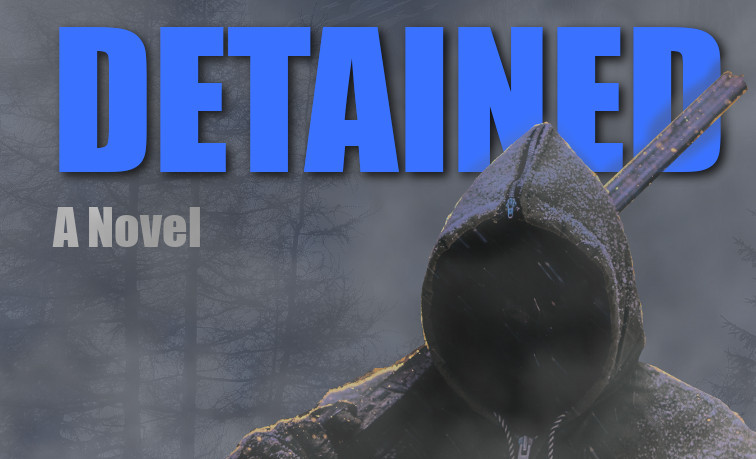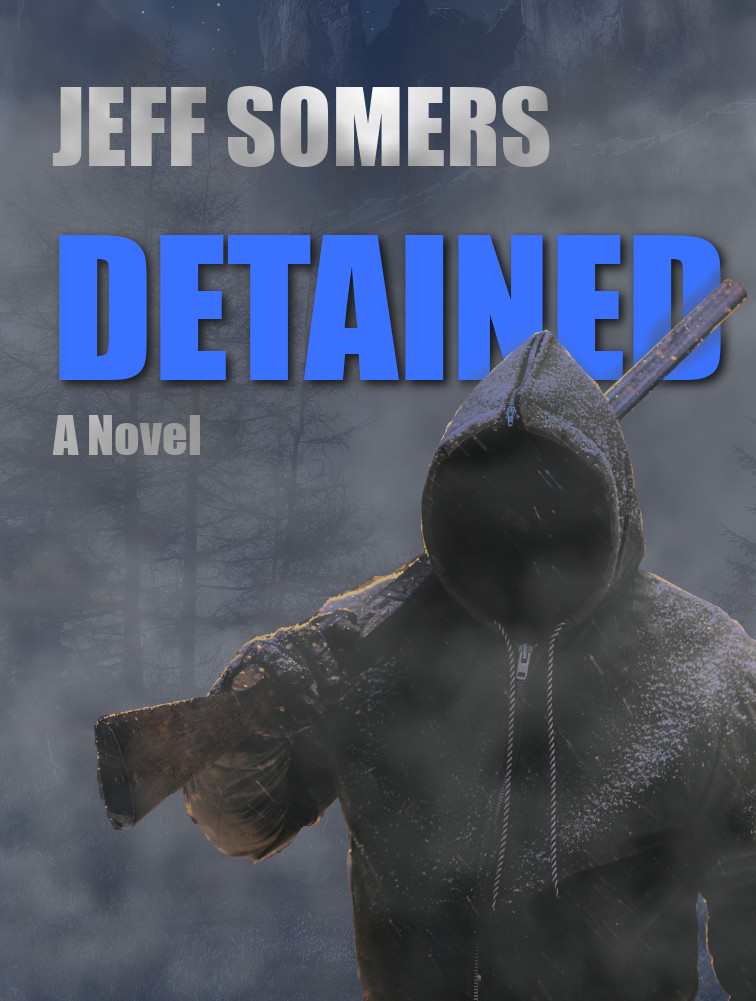Detained Chapter 10

I’ll be posting one chapter of my novel Detained every week throughout 2021. Download links below!
10. Mike
He had to admit he hadn’t expected much from Haggen, and it just went to show that no matter how much you saw or how many people you paid to hang out with you and show you how they lived, you could still be surprised.
He’d been restrained along with Haggen, plastic zip ties binding their wrists behind their backs, marched into the office, and shoved around pretty roughly—but not, he reflected, shot. This was either a renewed imposition of discipline from the colonel, or a new policy concerning the hostages. His face burned with swollen pain, one eye was closing, and when he breathed he felt the ragged tug of what he suspected was a bruised or maybe broken rib. He didn’t mind. He’d given just as good, and he’d been relieved that Haggen at least knew the one golden rule of staging a fight: You can’t stage a fight. You just had a real fight for staged reasons.
As soldiers marched them down the hall, he’d wondered again why the two of them were still alive. All Simms had done was try to leave.
Colonel Hammond leaned back in Jack’s chair and studied them. She was a woman that people would call handsome, he thought. The sort of tall, gawky woman who wasn’t unattractive, really, but who didn’t fall into any of the boxes you normally put a woman into. She wasn’t pretty, she wasn’t ugly. She had neither grace nor clumsiness. She was tall, but slight, had bright, clear eyes—and a presence. She was the sort of person you were instantly intimidated by, but who you couldn’t easily describe—at least not physically.
“This bullshit,” she said suddenly, spitting out the words as if with great self-control. “Stops now. Are we clear on that? Whatever bad blood exists between you two, it stops right now. There will be no second reprieve, yes?”
She was looking at him. Mike made a mental note, adding to the short list of information he’d managed to accrue over the last two hours: She didn’t know much about them. She’d demonstrated they knew all their names, and basic background, but her knowledge wasn’t deep. Or she hadn’t had time to read it all. She thought his fight with Haggen was not only legitimate, but based on an existing grudge.
“Or we get shot,” Haggen said, spitting a wad of blood onto the floor. “We get it, Kommisar.”
Her eyes shifted to Haggen, and Mike glanced at the computer. Candace had left it on. To his horror, the screen showed a photo of Raslowski. All the colonel would have to do was glance at it, and she would instantly know they’d been snooping. He wasn’t sure how she would react, and he didn’t want to find out. The phrase no second reprieve rang in his head.
His eyes scanned the room, landing on the thick black power cord that snaked from the back of the monitor to the power strip on the floor. The strip had a red switch on one end that would kill the power in an instant.
Mike marked the switch’s location and looked back at the Colonel. He could turn it off just by taking one step forward. He wasn’t worried about getting a beating, or getting into some other trouble. He knew if he did it while Hammond was sitting at the desk, she would notice the screen going off. She wasn’t an idiot. She would know something was up.
Hammond sighed and leaned back in the chair. She looked from Haggen to Mike and back again. For a moment he thought she looked absolutely exhausted, her face hollowed out, her eyes dull and blank. He thought, irrationally, that he was about to die: She would just decide not to worry about it, to kill them both to be safe.
“King, what’s the count?”
The soldier with the curly hair straightened up just slightly more. “The Doc counted off nine hours last,” she said.
Mike made a mental note: One more piece of data—nine hours, whatever that means.
Hammond nodded, then looked back at me and Haggen. “You gonna be a pain in my ass or can we consider this shit settled? In case you hadn’t noticed, my people are a little itchy. I’m sorry about your friend—I truly am—but if you cause one more lick of trouble for me, I’m going to hogtie you and dump you in the back with the beer kegs for the duration of this duty, are we clear on that?” She shook her head. “And that will be more for your own safety than anything else.”
Haggen nodded cheerfully. “You can put me in the back with the kegs any time, Colonel.”
Mike hesitated, then shook his head. “Everything you’re doing here is illegal. You’ve detained us illegally, you’ve killed an American citizen without cause, you’ve restrained me and … ” he hesitated, then on impulse decided to keep up the pretense that he was intimately involved, a local or at least familiar with everything and everyone. “… Jimmy, you’re trespassing—the list goes on.” He looked her right in the eye. “After killing one of us, how am I expected to believe you won’t just kill us all when you’re done here with whatever this is?”
Hammond leaned back in the seat and regarded him. Mike thought she was evaluating him, considering him, and it made him nervous.
“Mr. Malloy,” she said, her voice icy cold. “That is a possibility, unfortunately.”
Mike’s heart skipped a beat. Had she actually just admitted she might murder them all?
She leaned forward, planting her elbows on the desk. “I am hoping to avoid that eventuality, though. I am hoping to resolve this without any further bloodshed. Part of that is up to you—if you have influence over your people, use it to calm them down. Use it to keep everyone under control. Do that, and there’s a much better chance of avoiding any further problems. Because if crowd control becomes an issue here, we will fall back on alternative methods, without hesitation, understood?”
Mike was stunned, but managed to nod back. He started to agree, but remembered the computer screen. He need to play for time. He had the feeling that another outburst, another round with Haggen would just get them hogtied—or worse—but he didn’t know how else he was going to distract her.
Suddenly, Haggen leaned forward. “Well, Colonel, let me speak for all of us when I say you’re a right fucking cunt, and you all can go fuck yourselves.”
Mike stared. Was he crazy? He was going to get himself killed. He was going to get them both killed, right here, in this office.
The colonel had gone completely still. She stared at Haggen with a similarly disbelieving expression. The whole room seemed to have frozen.
Haggen nodded. “You got this bullshit command because none of the men would take it, right? You been cooling your heels in what—the commissary? The secretary pool, taking dictation?”
“Warner,” Hammond said in a tight voice. “Shut this piece of shit up.”
The other guard, a tall, lanky man with tree-like arms, nodded, but Haggen just smiled more broadly. “Sure, get the men to do your ass-kicking, too. Stupid fascist bitch. Been wanting to boss some men around, found a career path that let you do it. Bet every man in this unit wants to slap your bitch face but can’t risk their career. I bet—”
Warner stepped between Haggen and the desk and expertly socked him in the belly with one powerful punch. Haggen bent over, instantly reduced to a silent, red-face wheeze.
Hammond stood up. Mike didn’t hesitate; Haggen must have seen exactly what he did, and he’d distracted the colonel the only way he could think of. Mike stepped forward, bringing his foot down on the power strip. He heard the old computer suddenly go quiet, but no one else noticed. Hammond was still stepping around the desk, where she leaned down and took Haggen by the hair, forcing him to look up at her.
“Take this piece of shit and hogtie him in the back,” she said quietly. She straightened up and glanced at Mike, then wordlessly turned away. “Turn Malloy loose.”
King snapped out a small knife and stepped behind him as Haggen was literally dragged away, limp as a ragdoll and still struggling to breathe. “You people need to step back,” the soldier whispered as she sliced his ziptie free. “This goes hard or it goes easy, your choice. Spread that word.”
Mike nodded, numb. For a moment he couldn’t move; frustration seized him. They had little bits of information, but no answers, and they were no closer to getting out of this alive than before.

